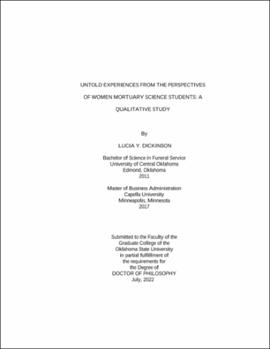| dc.contributor.advisor | Manning-Ouellette, Amber | |
| dc.contributor.author | Dickinson, Lucia Y. | |
| dc.date.accessioned | 2023-04-05T16:20:50Z | |
| dc.date.available | 2023-04-05T16:20:50Z | |
| dc.date.issued | 2022-07 | |
| dc.identifier.uri | https://hdl.handle.net/11244/337274 | |
| dc.description.abstract | Women students are entering mortuary science programs, being retained, and graduating at much higher rates than ever before. This is despite research that shows women in science-related programs often face discrimination and other barriers to degree completion (Bailey & DiPrete 2016; Jesse 2006; Shauman 2016; Steele et al., 2002; Title IX at 45, 2017). The purpose of this qualitative study was to explore current and former mortuary science students’—who identify as women—lived educational and professional experiences. A secondary goal was to generate recommendations to improve learning environments. This study focused on 10 mortuary science students’ educational journeys. Participants were recruited to participate in two, semi-structured interviews and asked to prepare and handwrite an “open letter” prior to the second interview. | |
| dc.description.abstract | After multiple cycles of coding (initial and focused), salient categories were developed, and I situated themes within them. This study applied an a posteriori framework, specifically the theory of gendered organizations developed by Joan Acker (1990) to code and understand how institutions or workplaces remain gendered. Three key findings emerged from the data analysis. First, participants were met with an abundance of gendered interaction processes that ultimately influenced their journeys in a variety of ways. Second, participants felt that their gender is either hyper-focused on or disregarded completely (gender blind). Their narratives unearthed that mainstream and gender blindness is present not only in organizational logic, but also in hierarchies, jobs, and their substructures, including forms and handbooks, and even funeral-related equipment. A final key finding of this study is that “bodied processes” and embodiment or consideration of the whole being are not welcome (age, race/ethnicity, body size, religion, sexual orientation, etc.) and affected the participants' educational journey by making it more challenging and forming unnecessary barriers. The outcomes of this study are intended to provide insight into what women’s journeys to becoming a funeral director look like and recommendations on how to adapt educational programs, both academically and professionally, to ensure all students are given an equitable opportunity in the funeral service industry. | |
| dc.format | application/pdf | |
| dc.language | en_US | |
| dc.rights | Copyright is held by the author who has granted the Oklahoma State University Library the non-exclusive right to share this material in its institutional repository. Contact Digital Library Services at lib-dls@okstate.edu or 405-744-9161 for the permission policy on the use, reproduction or distribution of this material. | |
| dc.title | Untold experiences from the perspectives of women mortuary science students: A qualitative study | |
| dc.contributor.committeeMember | Kearney, Kerri | |
| dc.contributor.committeeMember | Wanger, Stephen | |
| dc.contributor.committeeMember | McLaughlin, Heather | |
| osu.filename | Dickinson_okstate_0664D_17740.pdf | |
| osu.accesstype | Open Access | |
| dc.type.genre | Dissertation | |
| dc.type.material | Text | |
| dc.subject.keywords | educational leadership | |
| dc.subject.keywords | gendered organizations | |
| dc.subject.keywords | mortuary science | |
| dc.subject.keywords | organizational leadership and culture | |
| dc.subject.keywords | stem | |
| dc.subject.keywords | women | |
| thesis.degree.discipline | Education Leadership and Policy Studies | |
| thesis.degree.grantor | Oklahoma State University | |
